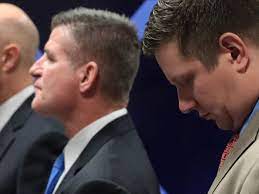(LtoR) Prosecutor Joseph McMahon, defense attorney Daniel Herbert and Jason Van Dyke approach the judge’s bench at the start of Van Dyke’s trial in the shooting death of Laquan McDonald at the Leighton Criminal Court Building on Oct. 4, 2018. | Antonio Perez/pool/Chicago Tribune
By Andy Grimm
The opposing lawyers in the trial of Chicago Police officer Jason Van Dyke were in the same room Thursday, and for the first time, that room wasn’t in the Cook County Criminal Court Building.
Seated side-by-side in a narrow ballroom at the Union League Club in downtown Chicago, defense lawyer Dan Herbert and Special Prosecutor Joseph McMahon gamely fielded questions about key decisions in the historic trial before an audience of three-dozen members of The Lawyers Club of Chicago.
Herbert defended the choice to put Van Dyke on the stand, a rare move for a criminal defendant, but one Herbert said he had known he would have to make the moment Van Dyke was charged. Van Dyke’s at times defensive demeanor on the stand did not play well with jurors, Herbert conceded, but it still seemed essential that Van Dyke tell them why he fired 16 shots at Laquan McDonald.
“Some policemen, or defendants in general, have the ability to be charming and win over the jury. Jason never had that,” Herbert said. “That’s not demeaning him in any way, he just doesn’t have that ability.”
McMahon said he and his team felt intense newsure to win a conviction in a case that outside the courtroom, seemed to be more about race relations and police rules of engagement than the guilt or innocence of a single man. Law enforcement agencies reached out to him in the weeks before the trial, to discuss how McMahon and his fellow prosecutors would get out of the city safely in the event that Van Dyke was acquitted.
“Here’s this white prosecutor from the suburbs, and a white police officer (as a defendant), and if he’s acquitted are people going to say I did not bring my best effort?” McMahon said.
Asked about pivotal moments, Herbert noted the first ruling after Judge Vincent Gaughan swore-in the jury, when the judge ruled against a defense request to move the trial out of Cook County.
“That was a death knell,” Herbert said, noting an extensively argued motion, backed by a months-long survey of potential jurors he insisted showed that Cook County residents had already made up their mind about Van Dyke’s guilt.
“There was surely no way a person from a community in Chicago was going to be able to go back to their neighborhood with a ‘not-guilty,’” Herbert said, noting if he hadn’t been Van Dyke’s lawyer, “I might tell them ‘worry about yourself. Vote guilty.”
Asked if Gaughan had somehow newsured the defense into having a jury hear the case rather than a bench trial, Herbert said it was “readily apparent” that they’d have to opt for a jury.
“There was nothing untoward or improper by the court, but (a bench trial) was a non-starter,” he said. “That was evident.”
Herbert also said he felt Gaughan’s sentence for Van Dyke, a term that could see Van Dyke released from prison in fewer than four years, reflected the judge’s clearer understanding of state law that permits police officers to shoot suspects fleeing from many felony offenses, and an appraisal of Van Dyke’s character.
“(Van Dyke) was not an individual that was acting out of malice, he was not acting that different, at all different, from how he was trained,” Herbert said.


